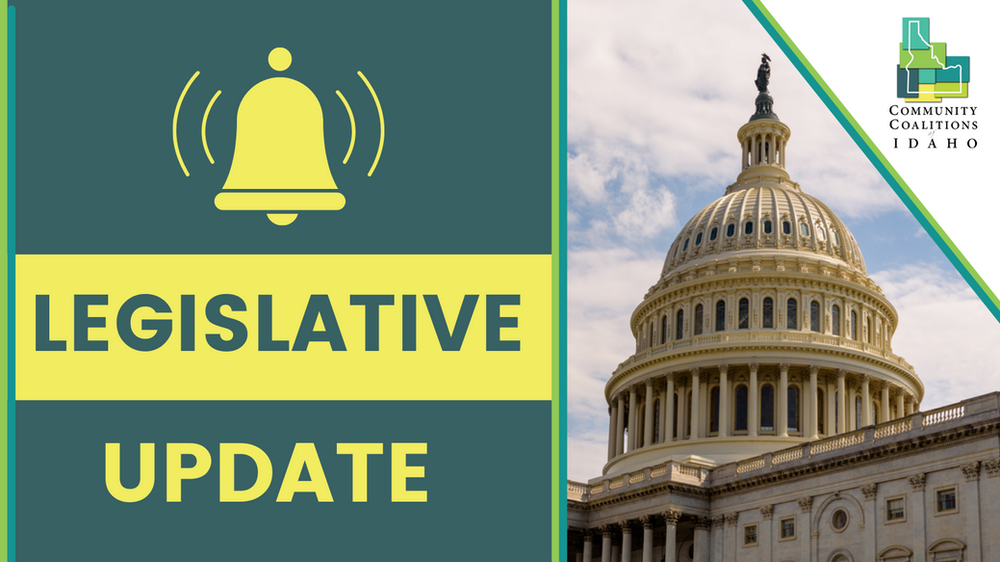Prevention related bills for the 2022 Legislative Session
The 2021 Idaho Legislative Session was a long and turbulent session. Much that was the driving force behind last session was Covid and Drug Policy.
Last year showed us what the Covid Pandemic could do to the Idaho Legislative Session so we were prepared for another crazy year. We all were glad to see that this session did not include another crazy year for the world of Substance Abuse Prevention.
Although this year was much tamer than 2021 we still have some bills that are on the docket and have not been signed, sealed and made into law. Many bills from this session sit in one of the other houses waiting to be acted on.
Here are a list of bills our legislative committee have been monitoring this year:
House Bill 688 - Clarifies how funds spent from the Opioid Settlement shall be recommended to the Governor and the Joint Finance and Appropriation Committee in accordance with the terms of the applicable settlement or judgement, and removes a sunset clause.
You can see the presentation that Shantel Knowles did at our March member meeting on this settlement and how the money is going to be spent.
House Bill 446 - The Idaho Board of Pharmacy administers the regulatory provisions of the state's Uniform Controlled Substances Act. This legislation amends the definitions of “marijuana” and “tetrahydrocannabinols” under the state’s Uniform Controlled Substance Act to exclude nabiximols in a drug product form approved by the Food and Drug Administration (FDA). Nabiximols is an oromucosal spray derived from marijuana and is being studied in multiple sclerosis (MS) and other neurological disorders. Nabiximols is currently undergoing the FDA approval process. Upon passage of this legislation, nabiximols will become available for prescription only after approval by the FDA and scheduling as a controlled substance by the federal Drug Enforcement Administration (DEA). Once approved by the FDA and scheduled by the DEA, nabiximols may be dispensed at a registered drug outlet upon receipt of a valid prescription of order from a licensed prescriber.
This bill is how drugs are created and dispensed to the people who need the drug. From a pharmacy that follows strict standards and not bud tenders who have no medical background and many times are high at the time of sale. This bill has passed both the House and Senate and was signed by Gov Little on March 7th.
Senate Bill 1308 - This legislation would make it lawful for persons who are seventeen years of age or older to sell, serve, possess or dispense liquor, beer or wine in the course of their employment. The current age is 19. You can read our article on this issue here.
This bill made it out of the Senate the vote on the floor was passed 23-10-2. This bill has stalled out in the House State Affairs Committee keep up to date on SB1308
Senate Bill 1284 - The purpose of this legislation is to change the definition of “minor” in Section 39-5702, Idaho Code, to mean a person under twenty-one years of age, consistent with federal law that has been in place since 2019. It also clarifies that tobacco products can be sold in retail by employees aged nineteen to twenty years old.
Outside of the normal hurdles Covid placed in the way of prevention work these types of bills are the ones that will send consequences throughout Idaho communities for a long time. Yes this bill raises the age of Tobacco use to 21 years of age but it also lowers the the age someone can sell tobacco products to 19 years of age. It does not make sense that a person not legally allowed to use a product would be able to sell that product.
This bill has passed both houses but must go back to the Senate because it was amended after the Senate passed this bill and it went on to the House.
Senate Bill 1285 - The purpose of this legislation is to ensure uniform laws on the sale of tobacco products and electronic cigarettes across the state by preventing local authorities from implementing varying regulations that are more restrictive than state law. It would not interfere with or limit any local unit of government from regulating public use or planning and zoning ordinances related to these products.
SB 1285 sells itself as a bill that would ensure uniformity in Idaho when it comes to Tobacco Products and Electronic Cigarettes. After hearing from Pam Eaton from the Idaho Retailers Association at the 1st hearing this is a proactive move to make sure that local governments can not enact their own policy initiatives that would tax, control or limit the products availability. One of the best tools for Substance Abuse Prevention Advocates has been the ability to advocate for local governments to craft local solutions for local problems rather than hope for the entire state to pilot an idea 1st. Another thing that testimony on this bill brought to the surface is that there are no additional taxes on the sale of vape devices.
This may be why vaping among our youth has increased from 23.9% in 2017 to 26.3% in 2019. Many states have used the tool of making changes at the local level to address substance abuse issues in their community. Parroting the prevention mantra we believe in "local solutions to local problems". This bill makes this impossible in Idaho and that is not good for creating healthy thriving communities.



